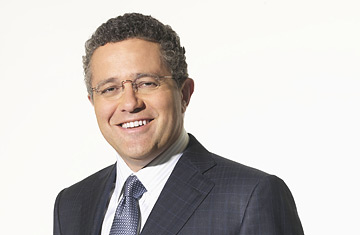
Jeffrey Toobin
In his new book, The Nine: Inside the Secret World of the Supreme Court, Jeffrey Toobin proves again that he is one of the sharpest court watchers in America. Based on rare interviews with the Justices, Toobin, the legal correspondent for CNN and The New Yorker, traces the extreme rightward turn that the high court has taken under George W. Bush. Yes, Virginia: the Supreme Court reads the election returns. TIME's publishing reporter, Andrea Sachs, caught up with Toobin just as his book hit the shelves.
TIME: How did you report this book? The court is famously secretive.
TOOBIN: I went right to the source. I went to the Justices and their law clerks, and got a wonderful — but not 100% — response.
What has the impact been of the two new Bush Justices, John Roberts and Samuel Alito?
This is a much more conservative institution than it was two years ago. There will be no surprises with the Chief and Justice Alito. They are committed fervent judicial conservatives, and they're not going to change.
How was the Bush Administration able to be so much more precise in its selection than earlier administrations?
The people doing the picking cared more about a guaranteed result. The [Justice David] Souter experience shaped the George W. Bush experience. [Souter, selected by the senior Bush, turned out to be much more liberal than expected.] The conservative movement devoted enormous energy to electing George W. Bush President. And George W. Bush himself is a far more conservative President than his father. So this wasn't a question of pleasing the base. This White House is the base, and they wanted Justices who would reflect their views.
Does this mean that Roberts and Alito weren't forthcoming about their conservatism when they testified at their confirmation hearings?
I don't think it's a matter of not telling the truth. The Senate didn't force them to answer questions about their judicial philosophy, so they didn't. It's just that they didn't answer the most important questions, because they didn't have to.
How has the shift rightward affected the more senior Justices on the Court?
The court is more polarized than it's been in easily a generation. In its current makeup, we are looking forward toward years of 5-4 rulings, with [Justice] Anthony Kennedy usually siding with the conservatives. [Justice Sandra Day] O'Connor was sufficiently a wild card that the alliances could never be predicted with precision. Now, we're looking at very predictable results. But the Court never stays the same. I don't think [Justice John Paul] Stevens, [Justice Ruth Bader] Ginsburg and [Justice David] Souter will be around for more than another few years.
Your book strongly suggests that personalities and personal views are more important than case law.
These Justices have tremendous discretion. The one thing that the Chief Justice said in his confirmation hearings that I completely disagree with is that Supreme Court Justices are like umpires; they just call balls and strikes. No. They make the rules. They are the commissioners of baseball. In fact, they are more like Abner Doubleday than an umpire. Deciding whether race can be used in college admissions, deciding whether states can ban abortion: those are not purely legal judgments. Those are political judgments, and the views of the Justices matter more than the Court precedents on questions like that.
Since you bring up Roe v. Wade, what's its future?
It depends who wins the 2008 election. If a Republican wins the 2008 election, Roe v. Wade will be overturned. There is no doubt about that. If a Democrat wins, it will likely remain in force. I don't feel that I'm going out on much of a limb there. But I think that's appropriate. The Republican party has been on record opposing Roe for two decades, and they've appointed 11 of the last 13 Justices. By rights it probably should have been gone by now.
Was Bush v. Gore, the Court's 2000 election decision, a low point in the Court's history?
I think Bush v. Gore was a disgrace. It was so transparently political, so poorly reasoned, so inconsistent with the prior views of the Justices.
How has the Court handled gay issues?
[Justice] Anthony Kennedy's approach to gay issues has put him on the liberal side. There have been five votes for gay rights on the court for some time. I expect that will actually continue as long as the court remains as it is.
What would happen if a gay-marriage case made it to the Court?
There's no way this Court is going to say that gay marriage is required by the Constitution. I think they will leave that to the political branches; if the states want to pass gay marriage, let them pass gay marriage. But they're not going to impose it.
What did you think of the Senator Larry Craig case?
If Craig had challenged the case, it sounds like he might have had a real chance of winning at trial. But it's always virtually hopeless to plead guilty, and then say you're innocent. I think the notion of criminalizing what Craig was accused of doing [making a sexual advance to a male police officer in a bathroom] is questionable. But Craig really forfeited the right to make most arguments by pleading guilty.
You used to be a prosecutor. Do you miss practicing law?
I would love to try a case again in my life. But I certainly prefer my current job to being a full-time lawyer. You can't have everything.
Do you suppose that you would enjoy being a Justice of the Supreme Court?
Absolutely! If nominated, I will run. If confirmed, I will serve. (Laughs).
